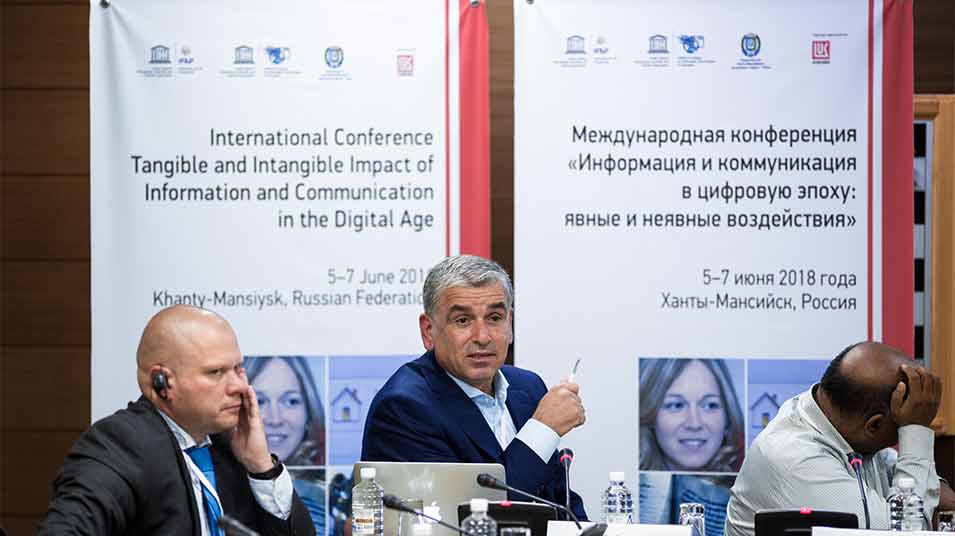University media professor showcases Israeli ‘electronic discrimination’ in international conference
Saleh Masharqa, a professor of media and coordinator of research and studies in the Media Development Center at Birzeit University, presented a research paper on justice in information access in the “Tangible and Intangible Impact of Information and Communication in the Digital Age” conference, held in Russia on June 3-8, 2018.
The conference, organized under the framework of the UNESCO’s Information for All Program, featured international media, law, education, and information technology professors and experts, who discussed topics such as expanding the digital universe, transforming social communications, culture and language in the digital age, access to information, openness in cyberspace, and challenges to digital preservation.
Masharqa’s paper, entitled “Justice and Right of Access to Information: A Case Study from Palestine,” reviewed the impact of the 14-year Israeli ban on the third generation of wireless mobile telecommunications technology for use in Palestinian territories.
Through reports from international organizations, civil society institutions, and expert testimonials, Masharqa presented the negative effects of the ban on the Palestinian domestic income, development of the education sector, e-commerce, open and electronic governance, e-payment systems, and achievement of the United Nation’s Sustainable Development Goals.
Masharqa also discussed, in his paper, the Palestinian legislature’s attitude toward information access, which was lacking and led to the adoption of an unratified Cybercrime Law that has led to negative results.
In its final version, the Cybercrime Law, Masharqa wrote in his paper, hinders free, safe access to information by imposing overt and covert surveillance on internet users.
A new kind of discrimination
Masharqa said that the Israeli ban on 3G telecommunications technologies amounted to a new type of discrimination that he referred to as “electronic discrimination.” He further noted that the ban was aimed to create a dichotomy between Israelis who are “digital, connected, interactive, and have an online presence,” and Palestinians who are “non-digital, invisible on the internet, unskilled in using telecommunications technologies, and digitally primitive.”
To combat such discrimination, Masharqa called for an expansion of digital rights, saying that it should be internationally mandated by the United Nations and human rights organizations. The laws, he added, should not only protect the right of individuals and communities to access information and the internet, but also to own new generations of telecommunications technologies and the legal and digital infrastructure needed to operate them.
“While Palestine is a major case study for such [electronic] discrimination, refugee camps and poverty-stricken areas around the world, as well as remote areas away from population centers, are all witnessing electronic discriminations just as Palestine does. People in these areas do not own modern telecommunication networks and do not have any control over their digital rights, which entails a lack of freedom of thought and expression and a violation of their privacy,” Masharqa commented.
In addition to expanding digital rights to cover more areas, Masharqa suggested adding the right to anonymity to the list of digital rights, preventing governments from accessing user information, and anonymizing user interactions online in such a way that provides them with a safe space where they can exercise their rights. Anonymity, he argued, will not encourage crimes or violations, pointing to its significance for social activists and national liberation movements.







